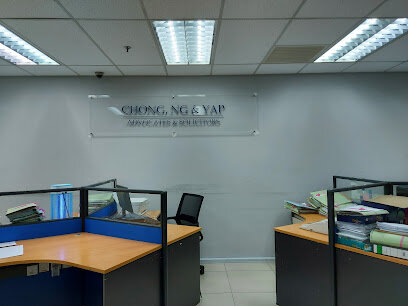Best Energy Regulatory Law Lawyers in Malaysia
Share your needs with us, get contacted by law firms.
Free. Takes 2 min.
Or refine your search by selecting a city:
List of the best lawyers in Malaysia
About Energy Regulatory Law in Malaysia
Energy Regulatory Law in Malaysia refers to the body of legislation and policies that govern the generation, transmission, distribution, and sale of energy, particularly electricity and gas, within the country. This area of law ensures that the production and consumption of energy are carried out in accordance with national interests, environmental standards, and consumer protection principles. The two main sectors regulated are electricity, mainly through the Electricity Supply Act 1990, and the oil and gas industry, governed by acts such as the Gas Supply Act 1993 and the Petroleum Development Act 1974. Regulatory bodies oversee licensing, compliance, tariff setting, and safety standards, ensuring the energy industry operates transparently and sustainably.
Why You May Need a Lawyer
There are several situations in which you might require legal assistance in the field of Energy Regulatory Law in Malaysia:
- Applying for licenses or permits to operate in the energy sector
- Understanding and complying with regulatory requirements imposed by government bodies
- Resolving disputes with regulatory authorities or other market participants
- Negotiating power purchase agreements or transmission contracts
- Facing enforcement actions or penalties for alleged non-compliance
- Dealing with issues related to renewable energy projects and grants
- Understanding changes in tariffs, subsidies, or incentive schemes
- Advising on environmental compliance related to energy projects
- Structuring cross-border energy transactions or investments
- Responding to or initiating judicial review of regulatory decisions
Given the technical complexity and constant evolution of the energy sector, legal counsel can be crucial in safeguarding your interests and navigating regulatory risks.
Local Laws Overview
Several key statutes and regulations shape the landscape of Energy Regulatory Law in Malaysia:
- Electricity Supply Act 1990 - Governs the generation, transmission, and distribution of electricity. It requires licensing for electricity suppliers and sets standards for safety, reliability, and tariffs.
- Energy Commission Act 2001 - Establishes the Energy Commission (Suruhanjaya Tenaga) as the main regulatory authority overseeing both electricity and gas industries.
- Gas Supply Act 1993 - Regulates the supply of gas through pipelines, including licensing provisions and consumer protection measures.
- Petroleum Development Act 1974 - Consolidates national control over the exploration and extraction of petroleum resources, designating PETRONAS as the sole entity with rights to develop Malaysia's petroleum resources.
- Renewable Energy Act 2011 - Promotes the development of renewable sources such as solar, biomass, and hydro. It implements feed-in tariff mechanisms for eligible producers.
- Environmental Quality Act 1974 - Overseen by the Department of Environment, this act ensures energy activities comply with environmental impact standards.
These laws are supplemented by various codes, guidelines, and subsidiary regulations tailored to specific energy sub-sectors or regions. Regular amendments and new policies are common as Malaysia pushes towards energy security and sustainability.
Frequently Asked Questions
What is the role of the Energy Commission in Malaysia?
The Energy Commission, also known as Suruhanjaya Tenaga (ST), is the main authority responsible for regulating electricity and piped gas supply industries. It oversees licensing, compliance, safety, consumer rights, and the development of policies for a reliable and efficient energy supply.
Do I need a license to operate a renewable energy business in Malaysia?
Yes, you typically need to obtain relevant licenses and approvals from the Energy Commission or the Sustainable Energy Development Authority (SEDA) before operating a renewable energy business. The type of license depends on the project size, energy source, and location.
How are electricity tariffs determined in Malaysia?
Electricity tariffs are set by the Energy Commission, taking into account the cost of fuel, operational expenses, customer protection, and the need for efficient energy production. Tariffs may differ for domestic, commercial, and industrial consumers.
What are the main regulations for oil and gas companies?
Oil and gas companies must comply with the Petroleum Development Act 1974, Gas Supply Act 1993, and safety guidelines issued by PETRONAS and the Energy Commission. Specific permits, environmental approvals, and local authority consents are also required.
Are there incentives for investing in renewable energy in Malaysia?
Malaysia offers incentives such as feed-in tariffs under the Renewable Energy Act 2011, investment tax allowances, and grants to encourage the development of solar, biomass, hydro, and other renewable energy sources.
Can foreign investors participate in Malaysia's energy sector?
Yes, but foreign investment is subject to government approval and may be limited by equity caps or joint venture requirements, especially in strategic sectors like oil and gas. It is essential to understand sector-specific regulations and approval processes.
What should I do if I am penalized for non-compliance by a regulator?
You should seek immediate legal advice to assess the grounds for the penalty, review compliance records, and determine whether to appeal, negotiate, or remediate the alleged non-compliance. Time limits usually apply for appeals.
How can land use and environment laws affect energy projects?
Energy projects typically require environmental impact assessments (EIAs) and must comply with land use plans and zoning regulations. Failure to comply can result in project delays, fines, or cancellation.
What agreements are commonly used in the energy sector?
Common agreements include Power Purchase Agreements (PPAs), Gas Supply Agreements, Transmission and Distribution Agreements, Engineering, Procurement and Construction (EPC) contracts, and Joint Venture Agreements.
Is it possible to review or challenge regulatory decisions in court?
Yes, affected parties may seek judicial review of regulatory decisions if they believe there has been procedural unfairness, an error of law, or abuse of discretion. Legal representation is usually necessary for such proceedings.
Additional Resources
If you need more information or wish to engage with relevant authorities, the following resources may be useful:
- Energy Commission of Malaysia (Suruhanjaya Tenaga) - Main regulator for electricity and piped gas
- Petroliam Nasional Berhad (PETRONAS) - Oversees oil and gas development
- Sustainable Energy Development Authority (SEDA) Malaysia - Implements and manages renewable energy policies
- Department of Environment, Ministry of Environment and Water - Environmental regulations for energy projects
- Malaysian Investment Development Authority (MIDA) - Information on investment incentives and approvals
- Malaysian Bar Council - Directory of lawyers with energy law expertise
Next Steps
If you believe you need legal assistance in Energy Regulatory Law, consider the following steps:
- Identify your specific issue and gather all relevant documents, such as permits, notices, agreements, or correspondence with authorities.
- Research lawyers or law firms in Malaysia with experience in energy regulation and sector-specific expertise.
- Schedule an initial consultation to discuss your situation and learn about your legal options.
- Prepare a list of questions or concerns, as well as a timeline of events related to your matter.
- Follow professional advice for compliance, negotiation, or litigation as needed.
- Stay informed of regulatory changes by subscribing to updates from the relevant authorities or industry associations.
Energy Regulatory Law is a complex and evolving field. Timely and competent legal guidance can help ensure compliance, resolve disputes, and support the success of your energy-related ventures in Malaysia.
Lawzana helps you find the best lawyers and law firms in Malaysia through a curated and pre-screened list of qualified legal professionals. Our platform offers rankings and detailed profiles of attorneys and law firms, allowing you to compare based on practice areas, including Energy Regulatory Law, experience, and client feedback.
Each profile includes a description of the firm's areas of practice, client reviews, team members and partners, year of establishment, spoken languages, office locations, contact information, social media presence, and any published articles or resources. Most firms on our platform speak English and are experienced in both local and international legal matters.
Get a quote from top-rated law firms in Malaysia — quickly, securely, and without unnecessary hassle.
Disclaimer:
The information provided on this page is for general informational purposes only and does not constitute legal advice. While we strive to ensure the accuracy and relevance of the content, legal information may change over time, and interpretations of the law can vary. You should always consult with a qualified legal professional for advice specific to your situation.
We disclaim all liability for actions taken or not taken based on the content of this page. If you believe any information is incorrect or outdated, please contact us, and we will review and update it where appropriate.
Browse energy regulatory law law firms by city in Malaysia
Refine your search by selecting a city.















